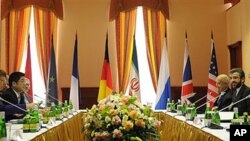MOSCOW - With new sanctions looming in two weeks against Iran, talks over Iran's nuclear program opened Monday in Moscow with a new spirit of urgency. Iran asked Western nations to ease sanctions as a pre-condition to stopping its nuclear enrichment project.
The demand came Monday as the five permanent member nations of the United Nations Security Council, plus Germany, met with Iranian negotiators in Moscow to try to persuade Tehran to drop plans to enrich uranium to 20 percent.
Iran claims it needs enriched uranium for medical and energy needs. Outside nations say it would put Iran on a fast track to making a nuclear bomb.
"The first step is to have the Iranians engage on 20 percent," EU foreign policy spokesman Michael Mann said of the talks. "And we have sanctions. New sanctions will come into force on July 1 and, as a general rule, sanctions can always be reviewed. But they can only be reviewed in response to concrete actions on the ground."
A first round of U.S.-led sanctions has cut Iran's oil imports nearly in half this year. Next, on July 1, European sanctions are to further slash Iran's oil revenue. EU countries will be banned from buying Iranian oil, and EU companies will be banned from insuring Iran oil cargoes.
Western diplomats said the Iranian government is starting to feel the bite of these sanctions. The proof, they say, is the Iranian demand to lift them.
After Iran's initial demand for an end to sanctions, negotiations here turned to point-by-point discussions.
At the end of Monday, Iranian spokesman Ali Bagheri told reporters that the talks were "constructive and serious."
EU spokesman Mann used similar language. "It was a tough negotiation. It was frank, businesslike," he said. "That's what it was about. It was about having serious discussions about serious issues."
Russia's spokesman said that a big gap remains between positions, but that the mood was "benevolent."
The Russians would like to see progress made in Moscow. They feel it would show Russia is back as a world player as Vladimir Putin starts his third presidential term. The Russians hinted that the Iran nuclear talks could stretch through Wednesday, an extra day.
Rajab Safarov, director of the Center for Modern Iran Studies in Moscow, charged that Western powers will try to make the talks fail in order to dent Mr. Putin's prestige. Last week, Safarov accompanied Russian Foreign Minister Sergei Lavrov to Tehran on a trip designed to try to unblock the logjam over Iran's nuclear program.
For more than a decade, Western nations and Russia have worried that Iran was working to build a nuclear bomb. Iran's advances in uranium enrichment pushed Iran and Western powers toward a showdown.
Iran's government has long been a sworn enemy of Israel. Analysts worry that if the nuclear talks here fail, Israel might bomb Iran's nuclear enrichment facilities.
The day before talks started here, Israel's Vice Prime Minister Moshe Yaalon said that Israel "could find itself facing the dilemma of a bomb, or to bomb."
Nuclear Talks Begin, Iran Wants Sanctions Lifted




